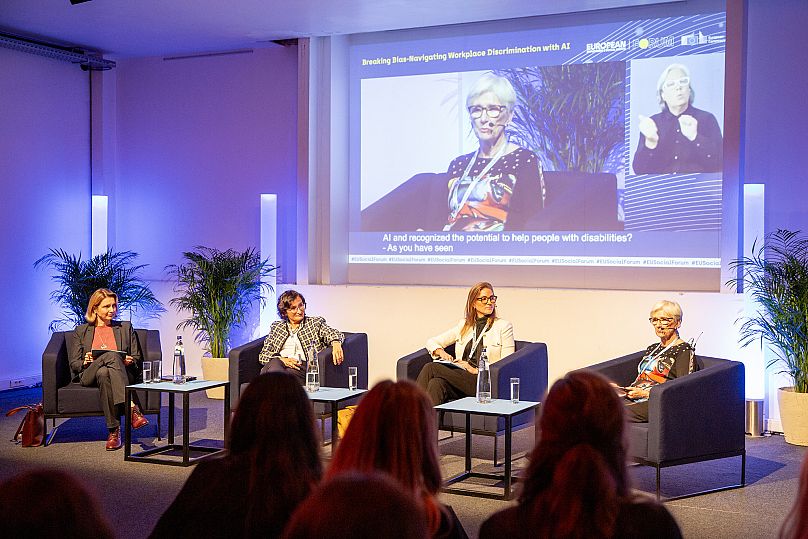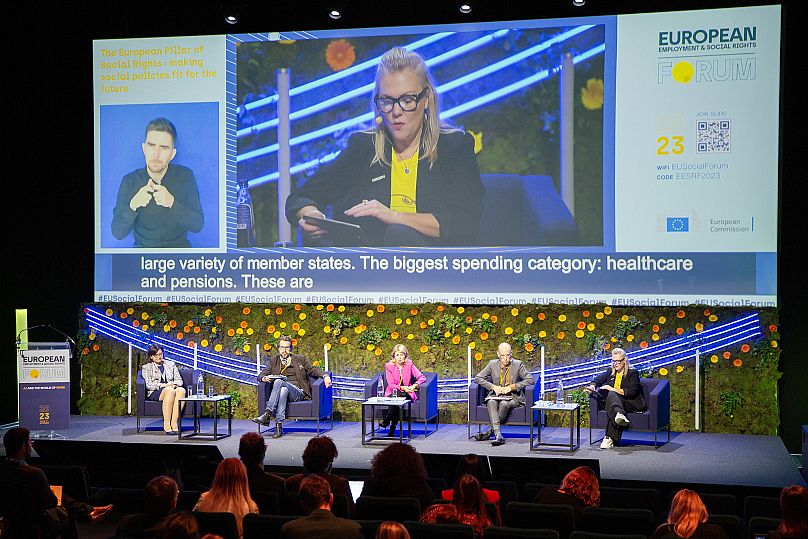Human capital is the powerhouse of Europe, but increasingly humans are working alongside new technologies and Artificial Intelligence (AI). Ensuring workers can harness the true potential of AI, while setting clear rules that uphold job quality was the central theme of this year’s European Employment & Social Rights Forum on 16 and 17 November.
The Forum explored the potential benefits of AI in business performance, job creation, workforce upskilling, and reducing physical hazards. Concerns were raised about potential negative effects such as job displacement, cybersecurity issues and discriminatory practices.
The introduction of AI is set to reshape our work landscape. Some jobs will disappear, new ones will emerge, and many will undergo significant changes. This shift will not only alter the required skill sets but will also prompt adaptations in schools and training programs. This changing work environment will, in turn, influence the dynamics between employees and employers.
The EU’s unemployment rate, at 6%, is at its historical low. However, until 2050 the EU working-age population is expected to shrink by 1 million people annually – that’s a small city lost every year. A smaller labour force, decreasing birth rates and more people aged 75+ will put a strain on labour markets, productivity and the competitiveness of the EU, as well as on social protection systems.
Harnessing AI to deliver benefits, while also protecting society – including workers – from its potentially harmful effects is essential.
“In the fast-changing world of work, we should always value innovation and performance, but we must also continue to protect workers with the right regulatory framework. We need to prevent abusive practices and ensure that the human remains in control,” explained Joost Korte, the European Commission’s Director-General for Employment, Social Affairs and Inclusion.
European Commissioner for the Internal Market Thierry Breton was also optimistic: “Artificial intelligence – and the data economy which is closely linked to it – marks very profound changes in our economy and our society. But we are preparing for it. Since the start of this mandate, we have put in place a framework to anticipate these transformations: with a holistic approach, essential given the versatility of artificial intelligence.”
Worker protection
European Commissioner for Jobs and Social Rights, Nicolas Schmit, explained that in the changing world of work linked to the emergence of algorithms and AI, platform workers need to be guaranteed the same rights as traditional workers. He said that a human-centric approach particularly in asymmetric relationships fired by algorithms was particularly important.
“With the new technologies such as ChatGPT, work can be more efficient, faster, facilitated, simplified,” said Schmit. “But we also need to ensure that workers profit from each new breakthrough. The biggest challenge is to establish a system where the gains made out of AI are distributed fairly.”
The Commission’s proposed Platform Workers Directive seeks to be the first defining instance of AI regulation in the field of work and aims to manage the so-called gig economy platforms.
Beate Andrees, Assistant-Director General and Regional Director for the Europe and Central Asia Region at the International Labour Organisation, pointed out that technology is both an opportunity and a risk. Opportunity to enhance activities, occupational hazard and safety measures, and to address labour shortage. The risk of algorithmic management comes during the recruitment and selection process, including propagating gender bias or undermining privacy rights. Organising platform workers can also be challenging because of the lack of physical presence at the workplace.
It is also key for workers to have a say in how changes to their roles might be managed. Esther Lynch, General Secretary for the European Trade Union Confederation (ETUC), said that keeping employees involved and invested in new processes is an important part of learning to work in harness with AI. “Workers want participation and discussion on change, and access to training. It’s necessary to enable frameworks to inform them,” she said.
The main message running through the Forum was clear: no matter how advanced technology gets, human workers still hold the key, and they should be the main beneficiaries of technological advancement.
Opportunities for AI
Tim O’Reilly, Founder and CEO of O’Reilly Media predicted that AI will affect every profession, but added that it’s impossible yet to forecast what AI is going to create. There’s a need to increase the transparency regarding the criteria used by AI companies to train their models and to regulate at the speed of technology, not the speed of current government actions.
Andrea Nahles, Chairwoman of the Federal Employment Agency, Germany, emphasised that no one should be left behind. The first step is to raise awareness. There’s hesitancy regarding upskilling, which can be met by better communication. She gave examples of where raising awareness is happening in Germany. Managing Director for Accenture, Laetitia Cailleteau, meanwhile said that the pace of transformation is unprecedented. According to a recent survey, 91% of executives are reallocating funds towards AI.
Skills also in the spotlight
With the European Year of Skills, much of the focus was on how EU initiatives are helping to boost digital skills on the ground. The European Employment & Social Rights Forum underlined how skills are essential for innovation, sustainable growth, quality jobs and European competitiveness and facing the green and digital transitions. One thing was clear: employers, employees and policymakers must all be prepared.
A recent Eurobarometer survey showed that 75% of small and medium sized companies find it difficult to recruit people with the right skills and nearly half of all adults and every third person who works in Europe lack basic digital skills. To overcome these obstacles, the EU has set the ambitious target of 80% of all Europeans with at least basic digital skills by 2030. The EU also wants to see 20 million ICT specialists employed in Europe by 2030, with balanced representation of men and women.
Entrepreneurship and social rights
A Q&A session on Youth Entrepreneurship discussed the requirements for young people to thrive and succeed as entrepreneurs in the age of AI. Hannah Wundsam, Managing Director of AustrianStartups, emphasised the need to instil an entrepreneurial mindset in students through programmes like Youth Entrepreneurship Week. She also highlighted the gap in entrepreneurship education at European universities and the challenges entrepreneurs face in securing venture capital for scaling up.
AI Ethicist, Olivia Gambelin, suggested moving beyond a risk-based approach and empowering entrepreneurs with resources to design AI in line with values.
Finally, a workshop on the European Pillar of Social Rights invited participants to think critically about what is needed to further implement the European Pillar of Social Rights as well as to make social policies in the EU fit for the future. Challenges such as demographic shifts, the green and digital revolution, skills shortages, unconventional work patterns, and the enduring spectre of poverty and inequality will have far-reaching consequences for the labour market and social protection systems.
Missed the 2023 EU Social Forum? Watch the wrap-up video and recordings of all of the Forum’s sessions.



